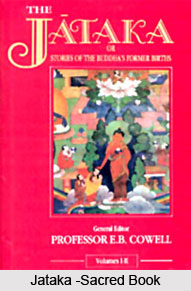 Jataka tales are ancient folklore and is one of the sacred books of the Buddhists which originated in India. Jataka Tales reflects the Buddhist morals, ethics and principles. The Jataka Tales contains various mythical tales on the previous birth of Gautama Buddha. The Jataka tales are dated between 300 BC and 400 AD. Jataka Tales are an important part of Buddhist literature.
Jataka tales are ancient folklore and is one of the sacred books of the Buddhists which originated in India. Jataka Tales reflects the Buddhist morals, ethics and principles. The Jataka Tales contains various mythical tales on the previous birth of Gautama Buddha. The Jataka tales are dated between 300 BC and 400 AD. Jataka Tales are an important part of Buddhist literature.
In 300 B.C, the Jataka Tales were written for the mankind to gain knowledge and morality. Ever since, Jataka tales have become story books that are both enjoyable as well as knowledgeable. Originally written in Pali language, Jataka Tales have been translated in different languages around the world. The luminous fables of "Jataka" are intended to impart values of self-sacrifice, morality, honesty and other informative values to people.
Etymology of Jataka
The word "Jataka" most specifically refers to a text division of the Pali Canon of Theravada Buddhism which is included in the "Khuddaka Nikaya" of the Sutta Pitaka. Jataka also means the traditional explanation on this book.
Contents of Jataka
Jataka, the canon of sacred Buddhist literature has a collection of some 550 anecdotes and fables. Jataka stories represent former incarnations of Lord Buddha, at times like an animal, a bird and sometimes like a human being, the future Siddhartha Gautama. The setting of the stories is made in or near Benares (Varanasi), which is a holy city in North Central India.
These divisions are based roughly on the number of verses quoted in each story. The 1st book contains 150 stories, each of which quotes only one verse. The 2nd book contains 100 stories, each of which quote two verses, and so on till the 21st, which contains 5 stories that quote 80 verses each, and the 22nd, which contains 10 stories that quote 100 or more verses each. Each story begins with a preface, which gives the circumstances in which the Buddha relates that particular story and revealing some event in his previous lives on his path to become the Buddha. At the end of each story, is a short summary in which the Buddha identifies the characters of his story in their present birth. Every story is also illustrated by a "Gatha", a lesson, teaching or moral in verse form which is uttered by the Buddha while still a Bodhisattva as part of the narrative. Sometimes these verses are said by the Buddha as himself. These verses are much more ancient than the stories, and perhaps the Jataka in its original form consisted only of these verses. Though these verses are almost impossible to understand without the accompanying stories and explanations, it is often the case that the commentary is passed on orally, in varying form, along with the core teaching or proverb.
Many of the Jataka stories are translated in several other languages from the Pali. Jataka stories tend to maintain the Buddhist morality of their Pali equivalents, but re-telling of the stories in Persian and other languages sometimes contain significant amendments to suit their respective cultures.




















